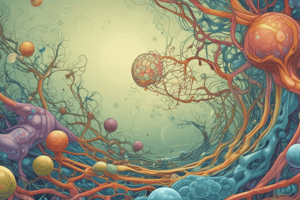Podcast
Questions and Answers
What does the Cell Theory state about cells?
What does the Cell Theory state about cells?
- Cells can arise from non-cellular materials.
- Cells are the basic units of life. (correct)
- All cells are identical in structure.
- Cells are only found in multicellular organisms.
Which of the following structures is NOT a common component of all cells?
Which of the following structures is NOT a common component of all cells?
- Genetic material
- Cytoplasm
- Chloroplasts (correct)
- Cell membrane
Which organelle is responsible for energy production in eukaryotic cells?
Which organelle is responsible for energy production in eukaryotic cells?
- Lysosomes
- Mitochondria (correct)
- Golgi Apparatus
- Ribosome
What is the primary function of the Rough Endoplasmic Reticulum?
What is the primary function of the Rough Endoplasmic Reticulum?
How do plant cells differ from animal cells in structure?
How do plant cells differ from animal cells in structure?
Flashcards are hidden until you start studying
Study Notes
Cell Theory
- The cell theory states that all living things are made up of one or more cells.
- All living things are made of cells, and all cells originate from pre-existing cells.
Prokaryotic vs Eukaryotic Cells
- Prokaryotic cells lack a nucleus and other membrane-bound organelles.
- Eukaryotic cells have a nucleus and other membrane-bound organelles.
Cell Composition
- All cells are composed of four main organic molecules: carbohydrates, lipids, proteins, and nucleic acids.
Essential Cell Structures
- Almost all cells have a plasma membrane, cytoplasm, and genetic material (DNA or RNA).
Plasma Membrane
- The plasma membrane is a thin, flexible barrier that surrounds the cell.
- It's composed of a phospholipid bilayer, with hydrophilic heads facing outward and hydrophobic tails facing inward.
Organelles and Their Functions
- Mitochondria: Powerhouse of the cell, responsible for ATP production through cellular respiration.
- Ribosomes: Sites of protein synthesis, responsible for translating mRNA into proteins.
- Rough Endoplasmic Reticulum (RER): Network of interconnected membranes studded with ribosomes, involved in protein synthesis and modification.
- Smooth Endoplasmic Reticulum (SER): Network of interconnected membranes without ribosomes, involved in lipid synthesis, detoxification, and calcium storage.
- Golgi Apparatus: Modifies, sorts, and packages proteins and lipids for transport within or outside the cell.
- Lysosomes: Contain enzymes that break down cellular waste products and foreign materials.
- Peroxisomes: Contain enzymes that break down fatty acids and toxic substances.
- Cytoskeleton: Network of protein filaments that provides structural support, facilitates movement, and helps with cell division.
- Centrioles: Involved in the formation of microtubules and spindle fibers during cell division.
- Nucleus: Contains the cell's genetic material (DNA), controls cellular activities.
- Nucleolus: Site of ribosome synthesis within the nucleus.
- Cell wall: Rigid outer layer that provides structural support and protection, found in plant cells.
- Chloroplasts: Site of photosynthesis in plant cells, containing chlorophyll pigment.
- Central Vacuole: Large, fluid-filled sac in plant cells, responsible for storage, turgor pressure, and waste disposal.
- Motor proteins: Move along cytoskeletal tracks to transport vesicles containing molecules.
- Vesicles: Small, membrane-bound sacs that transport molecules within the cell.
Plant vs Animal Cells
- Plant cells have cell walls, chloroplasts, and central vacuoles.
- Animal cells lack these structures.
Additional Terms
- Organelle: Specialized structure within a cell that performs a specific function.
- Phospholipid bilayer: The double layer of phospholipids that forms the plasma membrane.
- Cytoplasm: The gel-like substance that fills the cell, excluding the nucleus.
- ECF: Extracellular fluid, the fluid outside of the cell.
- ICF: Intracellular fluid, the fluid inside of the cell.
- IF: Intermediate filaments, a type of cytoskeletal filament.
Studying That Suits You
Use AI to generate personalized quizzes and flashcards to suit your learning preferences.




